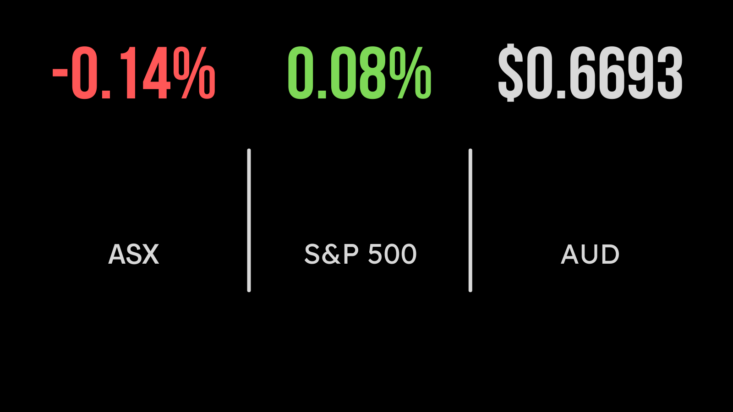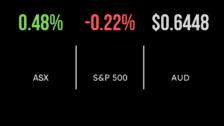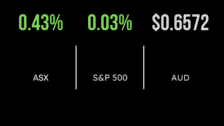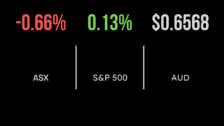Uranium gives the local market a glow
Uranium and gold miners led the way on Monday on the Australian sharemarket, but slumping lithium producers tempered that enthusiasm, as did the big bulk miners.
Weaker iron ore prices saw BHP shed 53 cents, or 1.1 per cent, to $47.18, while Rio Tinto lost 83 cents, or 0.6 per cent, to $128.32, and Fortescue eased 13 cents, or 0.5 per cent, to $27.24.
But uranium is a very different story, as the spot price climbed to just over US$103 a pound, a level not seen since 2007. Uranium gained about 90 per cent in 2023, as the market struggled to keep up with fresh demand, and it is still rising in 2024. The Biden Administration’s announcement last week of a US$500 million ($746 million) program to boost the domestic industry has only added fuel to that fire; as has the warning from Kazatomprom, the world’s biggest uranium miner, that it is likely to fall short of its production targets.
Forgive the pun, but the sector went nuclear on the ASX. Energy Resources of Australia, which is rehabilitating the old Ranger Mine in the Northern Territory, rocketed 1.5 cents, or 34.1 per cent, to 5.9 cents; Peninsula Energy, which owns the Lance uranium project in Wyoming, USA, spiked 2.5 cents, or 23.8 per cent, to 13 cents; Deep Yellow, which has uranium-rich properties in Namibia and Australia, jumped 15.5 cents, or 11.6 per cent, to $1.495; Boss Energy, which is re-starting the Honeymoon uranium mine in South Australia, surged 49 cents, or 9.6 per cent, to $5.58; and Namibia-based producer Paladin Energy advanced 9 cents, or 7.5 per cent, to $1.295.
Once-hot lithium sector cools further
However, it was a different story in lithium, where Arcadium Lithium (the merged Allkem and Livent) lost 52 cents, or 5.8 per cent, to $8.40; fellow producer Pilbara Minerals dropped 18 cents, or 4.8 per cent, to $3.56; project developer Liontown Resources lost 6.5 cents, or 4.4 per cent, to $1.42; and fellow developer Lake Resources gave up another half-cent, or 4.4 per cent, to 11 cents.
In coal, Whitehaven Coal strengthened 16 cents, or 2 per cent, to $8.13; New Hope Corporation was up 7 cents, or 1.3 per cent, to $5.38; and Stanmore Resources moved 17 cents, or 4.3 per cent, higher to $4.10; but Coronado Global Resources eased 2 cents, or 1.2 per cent, to $1.725.
In oil and gas, Santos added 28 cents, or 3.7 per cent, to $7.83, after the energy giant’s $5.8 billion gas project off the Northern Territory coast got the green light from a Federal Court ruling. Elsewhere, Woodside Energy appropriated 34 cents, or 1.1 per cent, to $31.63; Beach Energy gained 3 cents, or 1.9 per cent, to $1.605; but Brazilian-based producer Karoon Energy slipped 5.5 cents, or 2.8 per cent, to $1.905.
Among the industrials, retailer Super Retail, the owner of Rebel and Supercheap Auto among others, was in demand after a positive trading update, gaining 90 cents, or 5.7 per cent, to $16.71. There was also strong support for electronics retailer JB Hi-Fi, which advanced $2.02, or 3.5 per cent, to $59.88; and Premier Investments, owner of Peter Alexander and Smiggle among others, which climbed $1.08, or 4 per cent, to $27.80. In big-bank world, Commonwealth Bank put on 3 cents to $113.66; National Australia Bank added 4 cents to $30.95; ANZ Bank gained 5 cents to $25.95; and Westpac lifted 10 cents, to $23.29, up 0.4 per cent.
Biotech heavyweight CSL lost $1.23, or 0.4 per cent, to $289.17, while Qantas eased 24 cents, or 4.4 per cent to $5.17. The airline is being sued (again) by its workforce, with allegations that it underpaid aircraft engineers in the US as much as $US10 million ($14.9 million).
Nikkei rises from the ashes
The US sharemarket was closed on Monday for the Martin Luther King Junior Day holiday. European stocks were mostly weaker overnight, but the big story of the year so far is the long-suffering Nikkei 225 index in Tokyo, which has surged into the new year. The Nikkei has gained more than 5 per cent already in 2024 and has reached its highest level in 34 years. At 35,901.8 yen, the Japanese gauge is now just 8 per cent short of its 1989 peak of 38,957, and clear air is closer than it has been for a very long time.
Gold gained US$7.44, or 0.4 per cent, overnight to US$2,054.76 an ounce. The global benchmark Brent crude oil grade rose 40 cents, or 0.5 per cent, to US$78.69 a barrel, while US West Texas Intermediate oil softened 18 cents, or 0.3 per cent, to US$72.50 a barrel.
The Australian dollar is buying 66.59 US cents this morning, down from 66.87 US cents at the ASX close on Monday.











